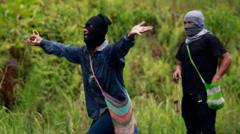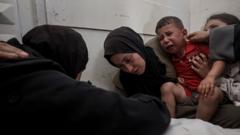Recent military operations by Indian security forces have led to the deaths of at least 27 individuals linked to Maoist insurgency, with government officials asserting that numerous senior militants have been targeted in the intensified campaign ahead of a March deadline for their defeat.
India Intensifies Military Campaign Against Leftist Insurgency

India Intensifies Military Campaign Against Leftist Insurgency
Security forces in India have escalated operations against Maoist rebels, resulting in multiple fatalities, as the government aims to eradicate the insurgency by next year.
India's ongoing conflict with Maoist rebels has entered a new phase, with a marked increase in military operations that have reportedly resulted in a high number of fatalities among suspected insurgents. On a recent Wednesday, security forces in the central state of Chhattisgarh announced that at least 27 individuals had been killed in targeted operations against the leftist insurgency. Police chief Prabhat Kumar confirmed that the initiative had taken out several senior militants, with local reports indicating that a notable leader, Nambala Keshav Rao, also known as Basavaraju, was among the casualties.
This latest operation follows another significant confrontation last week in which authorities claimed to have eliminated 31 members of the Maoist faction in a conflict-prone area straddling Chhattisgarh and its neighboring state. India’s Home Minister Amit Shah characterized the recent measures as a "historic breakthrough," emphasizing the government's commitment to extinguishing the Maoist threat by March.
However, the escalation of military actions has raised alarms among human rights advocates who are calling for comprehensive investigations into the circumstances surrounding the deaths. Questions have surfaced about whether all deceased individuals were indeed combatants or if innocent civilians were caught in the crossfire. Bela Bhatia, a lawyer engaged in the region, highlighted the challenges families face in identifying corpses, as government practices often delay the timely release of bodies for familial recognition.























